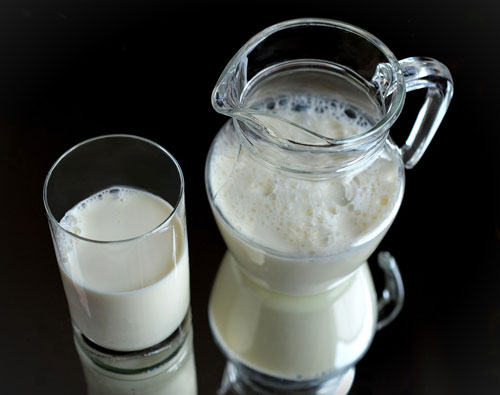Should we be worried about iodine?

Read our page on iodine.
New reports this week in the Daily Mail and Independent suggest that if we drink plant milks, we might go short of this trace mineral. The study these reports are based on found that plant milks generally don’t contain as much iodine as cow’s milk, which only contains iodine because of ‘farming practices’. So what are these farming practices and where else can you get iodine?
The iodine in cow’s milk is not a natural component of milk, it comes from iodine supplements in cattle feed and iodine-containing disinfectant used to sterilise milking equipment and added to teat dips and udder washes!
Iodine has been used clinically in the treatment of wounds for more than 170 years. Dairy cows’ udders are prone to infection (mastitis) and are routinely washed with iodine which is why some of it ends up in their milk. It is also added to animal feed and levels in milk can vary widely, especially in winter when cows are confined indoors and fed only iodine-fortified feed. There is up to 40 per cent less iodine in organic dairy products.
Iodine deficiency is rare in the UK. However, vegan diets have been blamed by some for the very few cases seen. We only need a small amount of iodine in the diet (around 140 micrograms a day), the vast majority of people in the UK get enough from their diet. In fact, the NHS says: “You should be able to get all the iodine you need by eating a varied and balanced diet”.
Cow’s milk contains around 30 micrograms of iodine per 100 grams so one large glass of milk, a cheese sandwich, a large plate of cauliflower cheese and a pot of yoghurt would still leave you shy of the daily target.
Plant-based foods high in iodine include iodised salt, wholegrains and seaweed.
In many countries, including the US, iodine is added to table salt. Although too much salt can raise your blood pressure, which puts you at increased risk of heart disease and stroke. Adults should eat no more than six grams of salt a day – that’s around one teaspoon.
Healthier, plant-based sources of iodine include cereals and grains (such as whole wheat and rye) and lower levels may be found in some fruit and green vegetables. Levels vary widely depending on the amount of iodine in the soil where the plants are grown. The key is to eat lots of different fruit and vegetables.
The seaweeds nori and wakame are an excellent source of iodine. Nori may also reduce breast cancer risk, while wakame may help those with high blood pressure. Avoid using kelp if you have a thyroid problem as it can contain excessively high levels. Some health bodies advise not eating seaweed more than once a week during pregnancy as it may contain too much iodine which can disrupt thyroid function. If you are concerned about getting the numbers right, you can always take a supplement.
For most people, the regular use of small amounts of powdered or crumbled seaweed added to soups, stews, salads, pasta dishes or used as a condiment, is an excellent way to ensure a good iodine intake.
The dairy industry is clearly on the back foot as the plant milk market is booming and showing no signs of slowing.
For more information see our Thyroid Fact Sheet on why iodine is important and vegan food support a healthy thyroid.
For practical information on going dairy-free, see our guide Everyone’s Going Dairy-Free.




